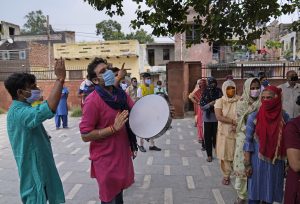For scientists to develop not one but multiple vaccines in record time is nothing short of a medical marvel – one that kick-started 2021 with a glimmer of hope that we would be able to contain a pandemic that has killed millions, pushed the global economy into recession, and hurt the most vulnerable, emotionally, physically, and financially.
In just a year, our world appeared to be on the cusp of a triumph over the pandemic. And yet, we managed to snatch defeat from the jaws of victory.
“The virus is on its way to becoming endemic. There’s no question about that but we are very much right now in the middle of this pandemic,” a World Health Organization representative told The Diplomat, adding that the global health body was observing how the pandemic will evolve in the coming weeks and months.
Despite multiple vaccines reaching the market by February of last year, vaccinating the world’s population has proven to be a tremendous undertaking.
As of January 24, over 9.87 billion doses of COVID-19 vaccines have been administered across the globe, yet much of the world’s population remains unvaccinated.
There are two reasons for the delays, the first of which is vaccine hesitancy. Even those who aren’t anti-vaccination per se doubt the over-achieving scientific advancement in medicine and delay getting themselves vaccinated. Surprisingly, vaccine hesitancy isn’t limited to the developing world, as we saw some of the richest countries be overwhelmed by anti-vaccination protests in 2021. While some oppose vaccines for religious reasons, many believe states’ mandates for vaccines to be a form of authoritarian governance and rally for individual freedoms.
On the other hand, the primary concern in the developing world is the second reason for the delays: lack of access to vaccines due to the world’s failure to ensure vaccine equity.
“Some countries are moving toward vaccinating citizens a fourth time, while others haven’t even had enough supply to vaccinate their health workers and those at most risk,” the WHO representative said, stressing that “booster after booster in a small number of countries will not end a pandemic.”
As of January 24, 60.5 percent of the world population has received at least one dose of a COVID-19 vaccine. High-income countries account for 77.68 percent of these while low-income countries account for only 9.5 percent of the partially vaccinated population.
In South Asia, Afghanistan has the lowest share of vaccinated population at just 11 percent. It is followed by Pakistan (46 percent), Nepal (53 percent), Bangladesh (56 percent), India (67 percent), Maldives (73 percent), and Bhutan and Sri Lanka (76 percent).
The numbers may not look so bad until you do the math and realize that while Pakistan has 1.7 percent of the world’s vaccinations, it accounts for 2.6 percent of the global population. In the same vein, Nepal’s share of world vaccination is just 0.3 percent against its global population share of 0.4 percent, Bangladesh 1.5 percent against 2.1 percent, India 16.7 percent against 17.5 percent.
On the other hand, the United States accounts for 5.4 percent of the global vaccinations against 4.3 percent of the world’s population; United Kingdom 1.4 percent against 0.9 percent, France 1.3 percent against 0.8 percent, and China 29.9 percent against 18 percent.
It is hardly a surprise, then, that COVAX, a vaccine sharing initiative that aims to provide vaccines to low and middle-income nations, lowered its estimated 2 billion dose delivery target for 2021 to 800 million – a number it struggled to meet until a flurry of donation activity by the rich countries late November and December.
In the absence of a mass vaccination drive, the virus not only spread uninhibitedly among unvaccinated populations but also mutated into new variants that now threaten even the vaccinated people.
The emergence of the Omicron variant, a relatively mild but supremely contagious mutation, has widened the gap even more with high-income countries ramping up booster drives. There are now more booster shots being administered in rich countries than first doses in low-income nations.
“An increase in people receiving boosters in wealthy countries, and a shortening of timelines of when boosters are recommended means that we could see, in the future, a situation where those vaccines are not available for developing countries,” Seth Berkley, the chief of Gavi, the Vaccine Alliance, told AP in December. “We are also beginning to see donors not wanting to donate their doses as fast as they might have because of the uncertainty now of where we are.”
“The longer inequitable access to COVID-19 tools persists, the longer the pandemic will drag on,” the WHO representative said. Describing inequitable access to vaccines as “a moral outrage and a global health security disaster that is having a devastating impact on the global economy,” he drew attention to the fact that “inequity is costing lives and providing the virus with opportunities to circulate unchecked and to mutate – threatening everyone, everywhere, and eroding hard-won gains.”
He underlined that although preliminary studies on vaccine effectiveness for Omicron suggest that an additional dose may confer benefit “it is too early to draw definitive conclusions from these limited lab and clinical studies.”
Yet, beyond the supply and deliveries challenges, distribution remains a critical issue in developing countries, with political constraints, social inequity, and weak healthcare systems overburdened due to the pandemic, hindering the dissemination of vaccines from airport tarmacs to people’s arms.

































